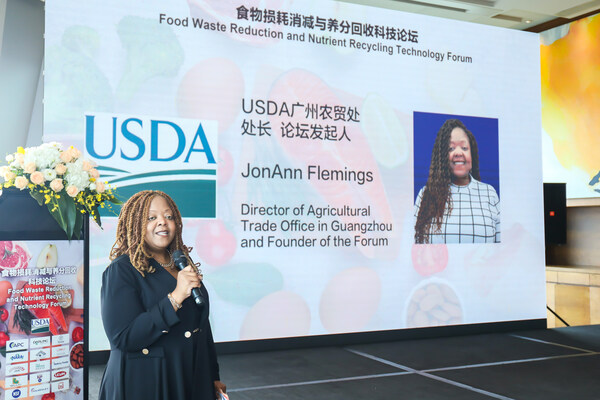The Food Waste Reduction and Nutrient Recycling Technology Forum was held in Park Hyatt Hotel in Guangzhou, China on July 17, 2023 to introduce US efforts toward the reduction of food loss and waste (FLW) to interested colleagues in China. In addition, the Forum shared practical success cases in reduction and re-utilization of FLW worldwide. The aim of this forum was to boost reduction of escalating FLW across the globe and potential re-utilization through innovative technologies. USDA's Agricultural Trade Office (ATO) in Guangzhou launched this forum and hopes to hold similar discussions in the future. North American Renderers Association (NARA) and Alaska Seafood Marketing Institute (ASMI) participated in the forum and shared their industrial expertise in processing by-products from meats, poultry, bakery and fishery for production of high-quality animal food ingredients.
JonAnn Flemings - Director of ATO in Guangzhou opened the forum and addressed the current status of global FLW, as well as the importance of FLW reduction toward the elimination of poverty, growth of economic prosperity, and the reduction of methane and carbon dioxide - two green-house gases produced during decomposition in landfill. She also stressed the need to conserve our natural resources (land, water, labor and energy). Jean Buzby, USDA FLW Liaison, introduced Sustainable Development Goals adopted by United Nations General Assembly in 2015 and a series of measures the US government is taking to reduce FLW, including Federal interagency collaboration across USDA, EPA and FDA, as well as public-private partnerships such as US FLW 2030 Champions. Buzby also outlined USDA's efforts to address the FLW issue including program funding, research, outreach and regulatory guidance. She briefly elaborated on The Emergency Food Assistance Program (TEFAP), Local Agriculture Market Program (LAMP), Compositing and Food Waste Reduction Program (CFWR), Rural Energy for America Program (REAP), Community Food Projects (CFP), Food and Agriculture Service Learning Program (FASLP), and Farm Storage Facility Loan Program. Buzby introduced FLW activities from around the world and shared success stories worldwide.
The subsequent agenda focused on the various technologies associated with processing raw materials from food industries prior to retail, where an average of 14% loss of the total food supply chain was estimated to occur. Representatives from Tyson Ingredient Solutions, APC, and Darling Ingredients, three member companies of NARA, shared production technology, quality control and applications of rendered chicken products, cookie meal and plasma from rendering, recycling of bakery products and animal blood processing. Andy Liu, sales director of Hasslev Machinery, provided technical information, energy cost, economic analyses of "Dry Rendering" and "Low Temperature Wet Rendering" and shared an authoritative research report of "Best Practice in Manufacturing of High-Quality Pet Food Ingredients" co-authored by Royal Canin and Hasslev, showing Dry Rendering, predominately adopted in the US rendering industry, delivers better benefits to pets, while recognizing that the technologies add value to the finished rendered products. Yan Wang, professor of Zhejiang University specializing in aquaculture nutrition, introduced current fishmeal supply status and reviewed his 20-year research showing applications of US rendered proteins, singularly or in combination, could significantly reduce fishmeal inclusion in diets of high-value marine fishes and become an essential option in global aquaculture.
Daniel Wu and John Burrows, representatives of ASMI introduced production of high quality fishmeal and fish oil from processing by-products of pollock and salmon. Representatives from NSF, Mid-West Ag Enterprises and International Ingredient Cooperation overviewed the creation of premium animal food ingredients from porcine mucosal tissues, fresh-caught fish and dairy ingredients, as well as the necessary safety and quality control practices in those industries.
The last two presentations focused on food waste, where an average of 17% waste in total food supply chain was estimated to occur post-retail. Pedro Urriola, Associate Professor at the University of Minnesota, compared the nutrient profile of food waste collected from various sources such as grocery store, student residence hall and compost transition stations, while he introduced technical challenges/risks in directly using food waste as livestock feed ingredients. Lucas Pang, Chief Technical Officer of InsPro Science - a leader in local black soldier fly production, introduced the Industry Intelligent System in the conversion of expired foods to premium pet food ingredients/treats. Recycling of nutrients from food waste from selected sources (i.e., food supermarkets) via industrialized husbandry of black soldier fly appears a more viable solution to food waste re-utilization than general composting and direct animal feeding.
This forum is the first time that such topics on FLW reduction, re-utilization, technologies and managerial practices in relevant fields were presented to the public and discussed across various industries. USDA's practices in FLW reduction, presented by Flemings and Buzby, showed valuable experiences by a responsible government, which could be used as a model by other countries. USDA's FLW outreach activities worldwide undoubtedly provide incentives to take actions towards the global reduction of FLW. The Forum's industrial collaborators demonstrated up-to-date technologies in re-utilization of FLW, the use of technology upgrades in similar industries in developing countries, while building more robust international supply chains for animal food ingredients.
Nearly 1,000 people attended the forum on-stie and on-line from over 500 companies in FLW collection and handling, restaurant/food market supply service, animal feeds, pet foods and other industries. It is estimated that the forum will be held again in 2024.
 Pages you might like
Pages you might like








 Latest information
Latest information
 Follow official account
Follow official account
 Online support
Online support
 鄂ICP备2022017323号
鄂ICP备2022017323号
 鄂公网安备 42018502006493
鄂公网安备 42018502006493
 Launch Exhibition
Launch Exhibition
 Release information
Release information




 Today's topic
Today's topic








